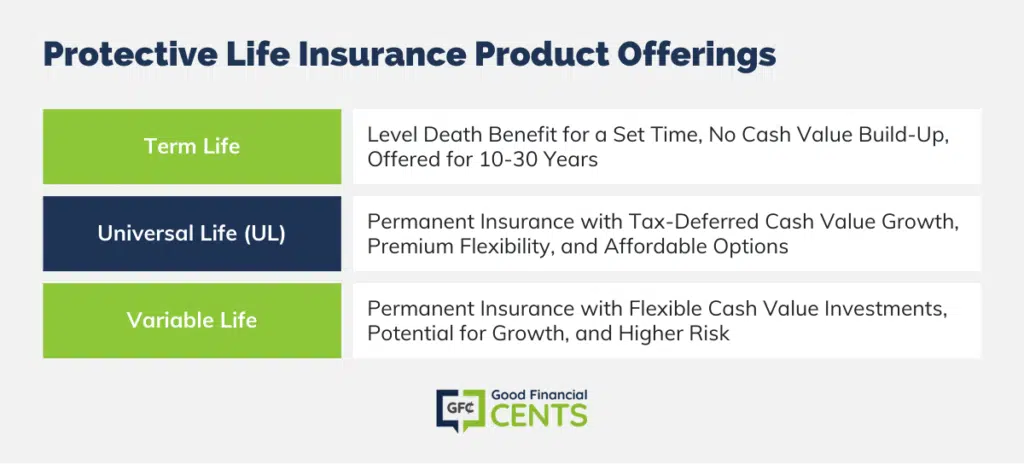Protective Life Insurance Company has a great record of working with its clients and can offer some of the best term life insurance rates available.

If you have ever shopped for life insurance, then you are probably well aware that there are several important variables that you should keep in mind when determining how and where to purchase your coverage.
First, at the top of your list, should be knowing how much protection to obtain. This is because you will not want your loved ones or other survivors to fall short when it comes to proceeds.
For example, if your beneficiary (or beneficiaries) will need a certain amount to pay for final expenses or other specific debts, then it will be important to purchase at least that amount of coverage.
But equally as important, though, will be ensuring that the life insurance company through which you purchase the protection is strong and stable from a financial standpoint.
This is because you will want to know that the company will be there to make good on its promise if or when the time comes for the policy’s beneficiary to file a claim.
One insurer that has been positive when it comes to paying out its policyholder claims for many years running is Protective Life Insurance Company.
Table of Contents
The History of Protective Life Insurance Company
Protective Life Insurance Company has been in the business of offering life insurance coverage for nearly 110 years. In the year 1907, the company’s founder, Governor William Dorsey Jelks started the insurer, just as President Theodore Roosevelt started his 7th year as a United States President.
Just a short two years later, in 1909, Protective Life Insurance Company paid out its very first death benefit claim – and the company has been faithfully doing so ever since.
By the year 1932, after just 25 years in the business, Protective had more than $65 million of insurance in force. And, by the time the company was in business for 50 years, it had nearly $1 billion.
Throughout the years, the company has grown and expanded. In part, it has done so by acquiring other insurers.
For instance, in 1997, Protective acquired West Coast Life, which helped in solidifying the insurer’s national presence. And, in 2006, Protective acquired Chase Insurance Group.
By 2007, the insurance carrier’s 100th anniversary, it had more than $252 billion of insurance coverage in force.
In 2015, the company became a wholly-owned subsidiary of The Dai-ichi Life Insurance Company, Ltd. Protective Life Insurance Company was, and still is, headquartered in Birmingham, Alabama.
Protective Life Insurance Company Review
Protective Life Insurance Company is known for serving its customers first. Based on testimonials, the firm is known for being flexible, as well as for providing dedicated service. Also, it is also very involved in the communities in which it serves.
The company provides a learning center directly on its website. This can help consumers to learn more about life insurance and how much protection that they may need, based on their specific situation.
Protective also offers a claims center on its website, as well. Here, claims can be filed directly online. Forms can be downloaded and sent in, and questions may be asked of customer service representatives.
Reps may be contacted in a number of different ways, including via a toll-free telephone line (during business hours), email, and an email form.
Business hours for reporting a life insurance claim are Monday through Thursday between 8:00 a.m. and 5:00 p.m. Central time and Friday between 8:00 a.m. and 3:00 p.m.
Additional information is also provided within the Protective Life Insurance Company online claims filing center, such as details regarding what to do when a loved one dies, and life insurance FAQ.
Financial Strength and Ratings
Protective Life Insurance Company is considered to be a very strong and stable company from a financial standpoint. It also is well respected for paying out its policyholder claims.
In 2015 alone, Protective paid out over 20,000 life insurance claims in the amount of approximately $1.9 billion.
The average processing time on a life insurance claim at Protective Life Insurance Company was 6.22 days. For this reason, the company has been given high marks from the insurer ratings agencies.
These ratings include the following:
- A+ from A.M. Best (Superior) This is the second highest out of a possible 15 total ratings.
- AA- from Standard & Poor’s (Very Strong) This is the fourth highest out of a possible 21 total ratings.
- A from Fitch (Strong) This is the sixth highest out of a possible 22 total ratings.
- A2 from Moody’s (Good) This is the sixth highest out of a possible 21 total ratings.
Although Protective Life Insurance Company is not BBB (Better Business Bureau) accredited, the BBB has provided Protective with a grade of A+. This is on an overall grade scale of A+ to F.
Over the past three years, Protective Life Insurance Company has closed a total of 39 complaints through the BBB. Of these, ten were closed over the past year.
Of the 39 complaints that were closed during the past three years, 18 had to do with problems with the company’s products and/or services, 10 were concerning billing and/or collection issues, 3 were with regard to advertising and/or sales issues, another 3 were having to do with guarantee/warranty issues, and five had to do with other issues.
Life Insurance Products Offered Through Protective
Protective Life Insurance Company offers a wide variety of different life insurance policies to choose from. This can help its customers to gear coverage more towards their individual protection needs.
Policy types offered through Protective include the following:
Term Life Insurance
Term life insurance can provide level death benefit protection for a set amount of time. This type of life insurance doesn’t offer cash value build-up, so it is often more affordable than a comparable amount of permanent insurance such as whole life or universal life coverage.
Therefore, it can be a good option for those who want a nice amount of coverage, but who may not have a lot to spend in premium.
Protective Life Insurance Company offers term life insurance plans that range from 10 to 30 years in level death benefit protection.
Universal Life (UL) Insurance
Universal life insurance is a form of permanent life insurance coverage. This means that it provides both death benefit protection, as well as cash value build-up.
The cash value will grow tax-deferred, meaning that there is no tax due on the gain unless or until the time that it is withdrawn by the policyholder. This can allow the funds to grow and compound exponentially over time.
A universal life insurance policy can be more flexible than some other types of permanent coverage like whole life insurance.
This is because the policyholder can choose – within limits – how much of their premium dollars will go towards the death benefit, and how much will go towards the cash component of the UL policy.
The Protective Life Insurance Company’s Custom Choice UL policy is a very affordable way to protect one’s family’s financial security if the unexpected were to occur. It offers low premiums for life, as well as a death benefit that is non-taxable (from income tax) to beneficiaries.
The premium rates can start as low as $7.32 per month – and, provided that the premium is paid, the coverage will remain in force for the remainder of the life of the insured. Also, the premium will also remain level for an extended period.
Protective Life Insurance Company also offers a survivor universal life insurance product. This could be a good option for someone who is married or part of a couple and has estate planning needs, such as helping beneficiaries to pay estate taxes and/or helping a loved one with special needs.
These types of policies are also often referred to as second-to-die or joint life insurance coverage. They cover two individuals under just one single life insurance policy – and because of that, they are often less costly than purchasing two single policies.
The death benefit that is paid out will be free of income tax to the beneficiary (or beneficiaries), and the proceeds may be used for whatever needs the survivor or survivors may have.
Variable Life Insurance
Variable life insurance is another type of permanent life insurance coverage. With variable UL, there is also a death benefit and a cash value component.
However, with this type of insurance coverage, there is additional flexibility with the investments that can be chosen in the cash component. For example, equities may be chosen, which can allow for additional growth.
They can, however, also pose more risk. Therefore, it is important to be aware of this before getting into any variable life insurance product.
Overall, a variable universal life insurance policy will essentially combine the “core” benefit of life insurance coverage via an income tax-free death benefit, along with a great deal of flexibility for the policyholder/investor in terms of cash value/investment build-up over time.
Note:

Other Coverage Products Offered
Protective Life Insurance Company also offers a Protect My Child life insurance policy. While most people do not want to ever think about the passing of a child, the truth is that sometimes accidents or illnesses do occur.
In this case, the cost of final expenses and/or uncovered medical expenses can be paid through a life insurance policy on a child.
The Protect My Child policy offers coverage of between $5,000 and $100,000. Because the policy is a permanent life insurance policy, it will also have cash value build-up.
Therefore, the plan will have tax-deferred savings that may be used for future college costs, the down payment on a house, a wedding, or any other needs down the road.
When the child turns age 18, the amount of the life insurance coverage will automatically double – at no additional premium cost. When purchasing the Protect My Child life insurance plan, premium rates can start as low as $6.37 per month.
And, because the policy is permanent, the rate is locked in never to increase. This means that the child can keep this same premium rate throughout the lifetime of the policy.
How to Find the Best Premium Quotes on Life Insurance Coverage
When seeking the very best premium quotes on life insurance coverage, whether it is through Protective Life Insurance Company, Banner Life Insurance, or any other insurer, it is typically best to do so via an agency or a company that works with more than just one life insurer.
This is so that you will be able to compare and contrast all of the options that are available to you, as well as the cost of each.
This is not only true when seeking the best life insurance coverage but for when shopping for other forms of coverage as well such as the best auto insurance companies and rates.
We know that buying life insurance can be somewhat confusing, There are lots of details to keep in mind – and you want to be sure that you are getting the very best deal from the best insurer for your needs.
How We Review Insurance Companies
Good Financial Cents systematically reviews U.S. insurance companies, emphasizing policy offerings, customer experiences, and overall reliability.
Our goal is to present a balanced and comprehensive perspective to potential policyholders. Editorial transparency remains a cornerstone of our approach.
We actively collect information from insurance companies and place significant weight on customer feedback. By integrating this feedback with our research, we can offer a well-rounded evaluation.
Each company is then rated based on multiple criteria, resulting in a star rating from one to five.
For a deeper understanding of the criteria we use to rate insurance companies and our evaluation approach, please refer to our editorial guidelines and full disclaimer.
Protective Life Review

Product Name: Protective Life
Product Description: Protective Life is an established insurance company specializing in life insurance, annuities, and asset protection products. Founded in 1907 and headquartered in Birmingham, Alabama, the company has garnered a reputation for its comprehensive product offerings and commitment to customer service. With over a century in the industry, Protective Life stands as a dependable choice for those seeking financial security.
Summary of Protective Life
With its inception dating back to 1907, Protective Life boasts a long-standing tradition of providing quality insurance solutions to its clientele. The company offers an extensive portfolio of products, encompassing term life, universal life, and whole life insurance, as well as various annuity options for retirement planning. One of Protective Life’s hallmark features is its focus on customizable coverage, allowing policyholders to tailor their plans according to individual needs. In addition to its core insurance products, the company is involved in asset protection, offering extended service contracts and credit protection products. Through its blend of diverse offerings and a rich legacy, Protective Life has firmly positioned itself as a trusted name in the insurance sector.
-
Cost and Fees
-
Customer Service
-
User Experience
-
Product Offerings
Overall
Pros
- Diverse Product Range: Protective Life provides a broad spectrum of insurance and financial products, catering to varied customer requirements.
- Customizable Coverage: The company emphasizes personalization, allowing policyholders to adapt their coverage to suit specific needs.
- Financial Stability: With its long history and strong financial ratings, Protective Life is seen as a reliable insurance provider.
- Customer-Centric Approach: Protective Life often receives commendations for its dedication to customer service and support.
Cons
- Pricing Variability: While Protective Life offers competitive rates, pricing might vary considerably based on individual health, age, and coverage choices.
- Policy Limitations: As with many insurers, certain policies might have specific exclusions or conditions that some customers find restrictive.
- Processing Times: Some customers have reported longer-than-expected processing times for policy issuance or claim settlements.







